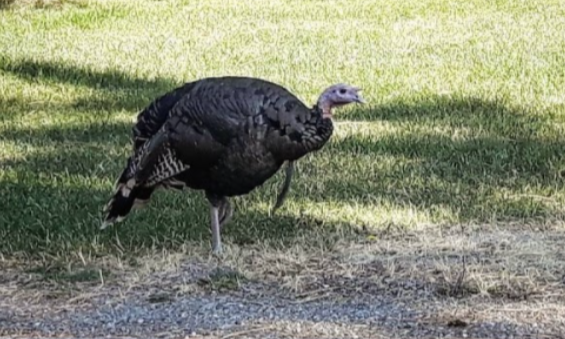Wild turkey in urban environments can cause substantial conflict with the area’s inhabitants, including humans and pets.
WildSafeBC said the birds can be a nuisance in some neighbourhoods, impacting lawn, gardens mulched areas and bird feeders. Turkeys have also been known to damage houses and vehicles.
“They don’t like reflective surfaces, so they’ll scratch at cars or windows if they see their own reflection because they think they’re another turkey. In reality, it’s their own reflection, but they need to be the most dominant turkey there, so they will start pecking and scratching vehicles” explained Danica Roussy, WildSafeBC Community Coordinator for Cranbrook and Kimberley.
Turkeys can also bring diseases, none of which are a threat to humans, but WildSafe still recommends against feeding, handling or petting wild turkeys.
The birds can also bring along ticks, mites, and lice, and some can be transmitted to humans.
In large groups, wild turkeys may be intimidating to people within an urban area.
“Turkeys that are comfortable around people are more likely to cause damage or attempt to dominate people, and it is a difficult problem to fix. The best way to prevent aggressive turkeys is to prevent them from becoming habituated to people in the first place,” said WildSafe.
Turkeys may also draw in predators which prey on the birds.
“Coyotes are a big fan of turkeys. We don’t want predators tocome in because they will also take a nip at your cat or small dogs,” said Roussy.
WildSafe has offered a number of recommendations to help keep turkey out of your property:
- Keep your lawn cut short and weed-free. Be sure to remove all dense brush and cover that may act like shelter or bedding material.
- Do not feed turkeys intentionally; this will encourage them to stick around likely cause problems
- Remove or secure all potential sources of food. This includes bird feeders and other attractants. It is unlawful to intentionally feed or bait ungulates or turkeys in the Kootenay Region, except under permit.
- Fencing – always check with bylaws prior to putting up a fence.
- Hazing techniques such as motion light detectors or sprinklers, opening an umbrella, leashed dogs, provided you can control them and the dog does not harm the turkey, banging pots and pans or, other noisemakers, like radios. This will make them feel threatened and therefore, leave the area.
- Turkeys that hang out on roads and highways are sometimes difficult to disperse, and if they become hazardous may need to be forcibly removed.




